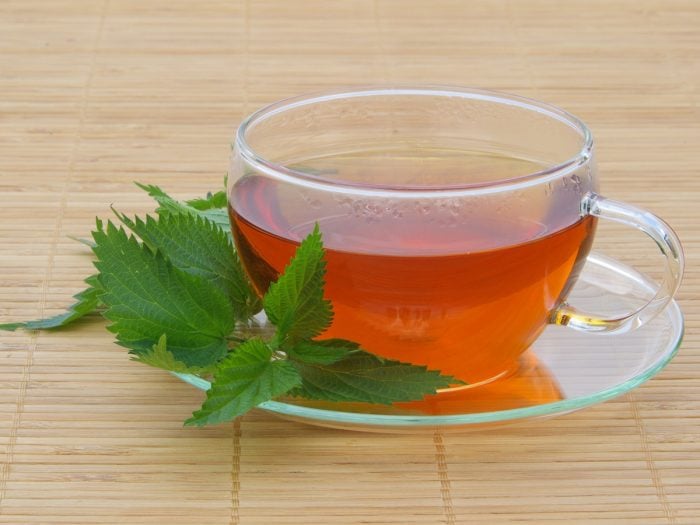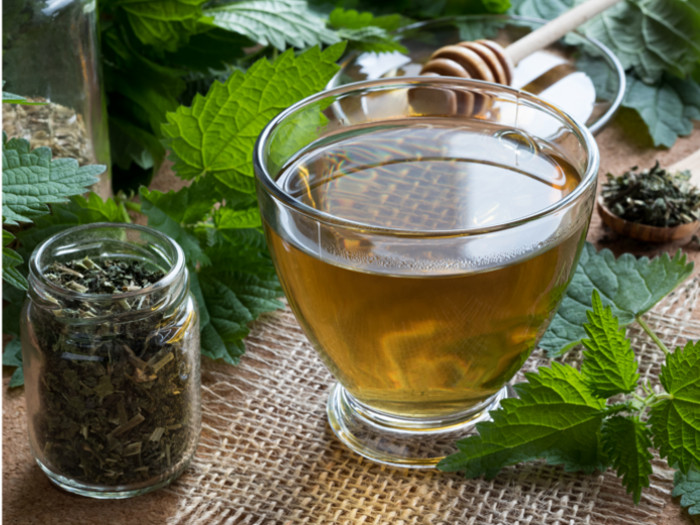Nettle tea is a delicious and beneficial beverage that helps boost the immune system, relieve pain and inflammation, protect the heart and optimize digestion. Nettle tea can be quite a strong beverage, and has a rapid effect on the body, primarily due to the flavonoids, carotenoids, vitamins, and minerals found in the plant.
What is Nettle Tea?
Found in Europe, Asia, and North Africa, stinging nettle is the origin of nettle tea and has the scientific name Urtica dioica. The nettle plant is an anti-asthmatic, antifungal, antibacterial, and astringent, a depurative, a diuretic, a galactagogue, a homeostatic, a hypoglycemic, a blood purifier, and a stimulating tonic.
What makes this beverage particularly interesting is that five of the six main varieties of this plant are covered with small spines and trichomes, which effectively deliver histamines and other irritants into the skin when they come in contact with humans and other animals. This defensive mechanism prevents people from eating or picking plants. If you soak stinging nettles in water, the chemicals causing painful stings are neutralized, making the plant harmless.
Health Benefits of Nettle Tea
The powerful health benefits of nettle tea include the following:
Reduces Pain & Inflammation
A study published in the Journal of Ethnopharmacology confirmed that there are natural analgesic and anti-inflammatory compounds in nettles. Whether using this tea to soothe the pain of a pulled muscle, a sore back, a headache, or any bump or bruise, you can often find relief before you finish your cup. [1]
Relieves Urinary Tract Infections
A 2016 study titled “Novel Strategies in the Prevention and Treatment of Urinary Tract Infections“, suggests that nettle has diuretic and antibacterial properties. Therefore, drinking nettle tea aids in the removal of toxins and makes an excellent remedy for bladder infections, urinary tract infection (UTI), and edema (water retention). [2] [3]
Lowers Blood Pressure Levels
Nettle tea contains phenolic compounds with diuretic properties, which aid in reducing systolic blood pressure. A study published in The Scientific World Journal shows that regular consumption of fresh nettle tea can help to treat hypertension. [4]
May Treat Prostate Symptoms
Many people suffer from benign prostatic hyperplasia (BPH), which can affect a number of urinary and sexual aspects of their life, and there are a few reliable treatments for it. Nettle tea improves prostate health, while also increasing the levels of testosterone in the body. This helps with certain sexual side effects of the condition.

Piping hot nettle tea Photo Credit: Shutterstock
Hives
Stinging nettle is used in homeopathy in Germany to reduce allergies such as hives (urticaria), a common skin rash triggered by a reaction to a medicine, food, stress, or other irritants. This is mentioned in a report by the European Medicines Agency, a union that evaluates all European medicinal products. [5]
Protects Heart Health
Histamine, present in stinging nettle, has anti-inflammatory effects on the body, which can help reduce the tension in arteries and blood vessels. This promotes healthier circulation and oxygenates the body properly, thus lowering your chances of cardiovascular complications. [6]
Reduces Allergic Reactions
The chemicals and organic compounds found in nettle also work as anti-histamines if consumed as a tea. This anti-inflammatory response of nettle is confirmed in an in vitro study performed by Dr. Ryan C Fink, University of Miami, US, in synergy with Herbal Science Group. [7]
Relieves Osteoarthritis & Gout
Phytotherapeutic compounds found in nettle tea have a beneficial effect on joint pain, osteoarthritis, and gout. Additionally, the extracts of nettle leaves can inhibit the inflammatory cascade in autoimmune diseases like rheumatoid arthritis, as mentioned in a study published in The Journal of Rheumatology. [8]
Reduces Hay Fever
Drinking nettle tea can help treat hay fever, and reduce allergic symptoms such as sneezing and itching and providing relief. Hay fever is a common allergic reaction caused by pollen or dust.
Other benefits
- Fights oxidative stress
- Source of antioxidants
- Blood tonic
- Hair & nail care
- Improves kidney health
- Relieves menstrual problems
- Increases lactation
- Promotes weight loss
- Used for skincare [9]
How to make Nettle Tea?
While nettle tea is easily available in departmental stores or across several e-commerce platforms, it can also be harvested and grown in your garden. You may have to experiment with the ratio of fresh leaves to water, according to your preference, but the default proportion would one cup of nettle leaves to every 2 cups of water. Let’s take a look at a simple way of making the tea at home.

Nutritious Nettle Tea Recipe
Ingredients
- 1 cup fresh nettle leaves
- 2 cups water
- 1 tsp honey/sugar (optional)
Instructions
- To make nettle tea, first, bring water to a boil on the stove.
- To the boiling water, add the fresh nettle leaves and reduce the heat down to medium.
- Let the leaves steep in the water for five to seven minutes. If you want the flavor to be stronger, allow the leaves to steep in water for a longer duration.
- If the flavor is too potent for your liking, you can add a spoonful of honey or sugar to enhance the taste. Once done, serve the tea warm and enjoy the hot, nutritional beverage.

Notes
Side effects of Nettle Tea
While nettle tea does have many health benefits, there are some concerns. These include: [10]
- Pregnancy issues: It is not advised for pregnant women as it can result in hormonal fluctuations that may be dangerous for fetal development. It can also cause uterine contractions and miscarriage, too.
- Kidney stones: If you are harvesting wild nettle leaves for personal use, make sure not to wait too late in the season, as certain harmful compounds increase in concentration at that time.
- Blood sugar: It is best avoided if you are diabetic or hypoglycemic as it lowers blood sugar levels.
- Lowers blood pressure: If you have heart disorders or are taking blood pressure medication, it is best to check with your doctor before having nettle tea.
- Blood thinners: Nettle tea has high levels of vitamin K and can interfere with anticoagulant medications (blood thinners). [11]
- Stomach problems: It can cause nausea, vomiting, or stomach pain.
- Insomnia: Nettle tea should not be taken with sedatives as an excess of it causes drowsiness.
Before adding any new herbal remedy to your dietary regimen, it is always a good idea to speak with your doctor first.
